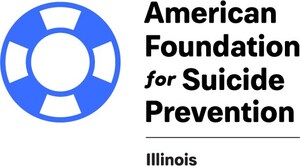Research and education help people know warning signs and what to do to help save lives
CHICAGO, April 24, 2023 /PRNewswire/ -- Efforts are underway to reach more people with suicide prevention information and interventions across Illinois during Mental Health Awareness Month in May. The Illinois chapter of the American Foundation for Suicide Prevention (AFSP) is sponsoring a "Talk Saves Lives" presentation that is open to all in addition to a Virtual Research Connection with the latest information on the suicide crisis among Black men.
Research Connection 12:00 p.m. – 1:30 p.m., May 17, virtual presentation
Addressing the Crisis of Suicide among Black Men: Real-Time Strategies and Future Directions
The Research Connection series features speakers discussing findings from AFSP-funded research. This spring, a virtual Research Connection will discuss the need for research to predict risk and prevent suicide among Black men, who have experienced an increase in suicide-related mortality in the past decade. Dr. Leslie Adams will introduce her ongoing AFSP Young Investigators Award project that aims to integrate digital health strategies using smartphones to identify suicide risk in real-time among Black men. The talk will cover the feasibility and acceptability of smartphone-based approaches to support future suicide prevention efforts with Black men. The event is free; registration is required.
Talk Saves Lives: An Introduction to Suicide Prevention
7:00 p.m. – 8:00 p.m., Thursday, May 18
This community-based presentation covers the general scope of suicide, research on prevention, and what people can do to fight suicide. Participants will learn common risk factors and warning signs associated with suicide, and how to keep themselves and others safe. The presentation is free and open to the public; registration is required.
"Suicide continues to be a national health issue," said Angela Cummings, executive director of AFSP-Illinois. "Increases in the suicide rate cannot be attributed to any single factor. Any number of factors, including mental and physical health conditions, family mental illness or family history of suicide, childhood trauma, abuse or neglect, and genetics, could play a role. That makes public education, research and advocacy to crucial in suicide prevention."
Latest data from the Center for Disease Control and Prevention (CDC) show suicide is a leading cause of death. In 2020, after unintentional injury, suicide was the 2nd leading cause of death for ages 10-14 and 25-34; and the 3rd leading cause of death for ages 15-24 (after unintentional injury and homicide). Almost 53% (52.9%) of all suicide deaths in the US are by firearm.
There is reason for hope: in a recent Harris Poll conducted by AFSP, three of four people believe there are warning signs for those at risk of suicide and the majority of adults in the U.S. (78%) believe that training and education for professionals (first responders, health care providers, community leaders, faith leaders, the media, etc.) would be most helpful for reducing the number of people who die by suicide.
In its advocacy efforts, AFSP can point to work with partnering organizations that has resulted in unprecedented increases in federal mental health funding–from $21 million in 2021 to $102 million in 2022, which included the creation of the new 988 number–a watershed moment in crisis mental health response.
Individuals can help prevent suicide by knowing the warning signs and getting help when warranted.
- Learn the signs of someone who may be at risk for suicide. Often there are changes in behavior such as mood swings, angry outbursts, or loss of interest in activities they love.
- Reach out to someone who you think may be struggling. Trust your gut if you are concerned. Ask directly if they have thoughts of ending their life – research shows this is helpful and does not put the thought in their mind.
- Connect those who are struggling to help. Share the 988 Suicide and Crisis Lifeline as well as general and other resources for minority communities.
Help is available. In a recent Harris Poll conducted by AFSP, more than half of adults in the U.S. (56%) believe not knowing how to get help keeps people who are thinking about suicide from seeking help, along with feelings of hopelessness (66%) and embarrassment (59%). With more than half of respondents not knowing HOW to get help, AFSP will continue educating on the resources. Help is available by calling or texting 988 to reach the National Suicide and Crisis Lifeline.
AFSP and its Illinois chapter are dedicated to improved research, education, and advocacy. Through its statewide network of volunteers, AFSP Illinois offers prevention education programs that emphasize the importance of research-proven self-care techniques as well as the value of engaging professional support.
If you or someone you know is at risk of suicide, please call or text 988 for the Suicide Crisis Lifeline. Or text TALK to 741741 or go to https://suicidepreventionlifeline.org/.
About the American Foundation for Suicide Prevention:
American Foundation for Suicide Prevention is dedicated to saving lives and bringing hope to individuals affected by suicide. The organization creates a culture that is smart regarding mental health through educational programs, advocacy for suicide prevention, and providing support for those affected by suicide. All donations go towards these efforts with the goal to greatly reduce the national suicide rate. For more: https://afsp.org/chapter/illinois
Suicide Prevention Resources: https://afsp.org/suicide-prevention-resources
Suicide Warning Signs: afsp.org/signs
Media: Reporting on Suicide Prevention: https://afsp.org/reporting-on-suicide-prevention
SOURCE American Foundation for Suicide Prevention
WANT YOUR COMPANY'S NEWS FEATURED ON PRNEWSWIRE.COM?
Newsrooms &
Influencers
Digital Media
Outlets
Journalists
Opted In





Share this article